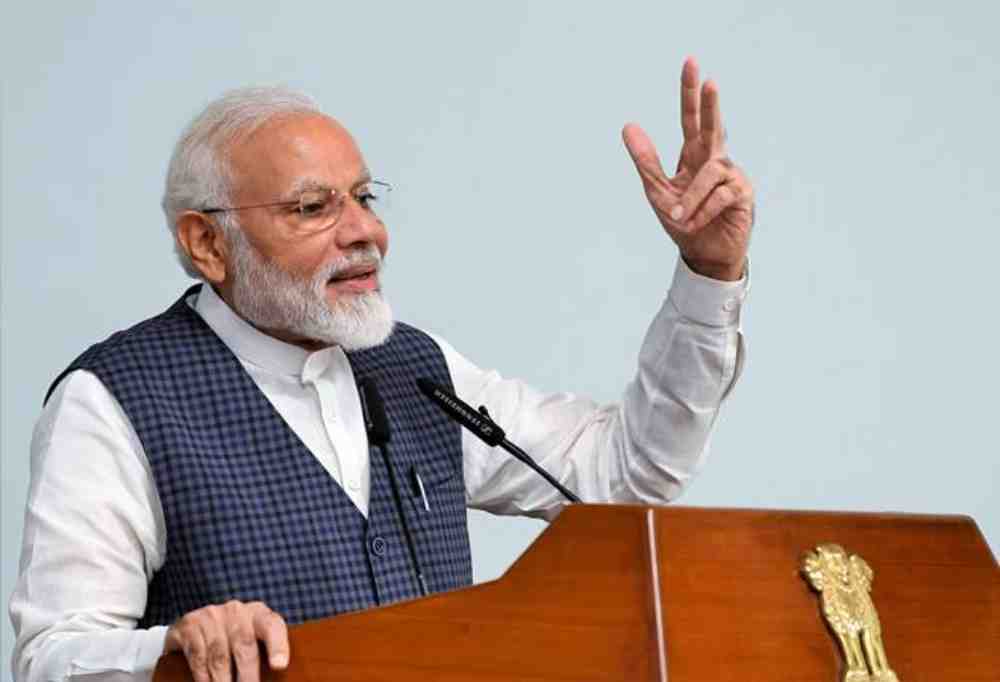
The Government’s roadmap for making India a $5 trillion economy comprises focussing on growth at the macro level and complementing it with all-inclusive welfare at the micro level, promoting digital economy and fintech, technology-enabled development, energy transition and climate action and relying on a virtuous cycle of investment and growth.
Where is the Goal Now?
The Indian economy is expected to grow at a 6.8% annual rate during the next five years, with labour contributing 10%, capital 52%, and efficiency 38% of the increase. The need for capital will be crucial, and the odds are in favour of a sustained uptick in the private sector investment cycle. By the end of the fiscal year 2023, investment as a percentage of GDP had already risen to a decade-high 34%.

The $5 trillion goal was first proposed in 2019. The country’s economy has reportedly grown to be the fifth largest in the world, with a GDP of $3.5 trillion in 2022.
While attending the BRICS Business Forum, Prime Minister Narendra Modi repeatedly affirmed that India will soon become a $5 trillion economy.
The Prime Minister said, “India is the fastest-growing major economy in the world. Soon, India will be a 5 trillion dollar economy. There is no doubt that India will become the growth engine for the world in coming years,”
while recalling reforms undertaken by his government in the past nine years.
Role of Startups in Driving this Goal

Emerging with innovation and modernity, startups play a huge role in driving India to the destined target. India’s startup ecosystem is vibrant and diverse, with entrepreneurs across various sectors creating innovative solutions to address local and global challenges. These startups can contribute significantly to economic growth by generating employment opportunities, fostering technological advancements, and attracting both domestic and international investments. Their agility and ability to disrupt traditional industries make them valuable players in the country’s economic expansion.
“To realize this potential fully, India must provide startups with a supportive ecosystem that includes streamlined regulations, access to affordable capital, mentorship, and infrastructure development. Additionally, promoting digital literacy and entrepreneurship education is crucial to nurturing a new generation of innovators who can drive the nation’s economic transformation,” shared Subhashis Kar, Founder and CEO of Techbooze Consultancy Services.
Signifying the importance of a collaborative effort involving the government, private sector, and investors, he added, “By fostering an environment that nurtures innovation and entrepreneurship, India can harness the entrepreneurial spirit of its people and pave the way for sustainable economic growth in the years to come.”
A significant motivator is India’s vibrant startup ecosystem, which is distinguished by new concepts, adaptable business structures, and cutting-edge technologies. Reportedly, more than 55,000 startups are currently functioning in the nation, and they are at the vanguard of developing innovative solutions in a variety of industries, from fintech to healthcare, e-commerce to renewable energy, significantly advancing our economy.
“Millions of young Indians are now employed by startups, which are also emerging as key job generators and solving a critical socioeconomic issue. They have utilized the potential of our young population to create over 1.3 million employment. Additionally, Indian companies are making their mark on the worldwide scene by luring foreign capital and extending their reach abroad. India’s status as a center for innovation and entrepreneurship is strengthened by this accomplishment,” remarked Manthana Prithviraj, Co-Founder and Product Head of Workhall.
Involvement of Wealth-tech Startups
The undeniable connection between wealth-tech startups and India’s ambition to achieve a $5 trillion economy by 2025 is evident. These startups serve as the catalysts for promoting financial inclusion, literacy and economic empowerment by providing individuals with the necessary knowledge and tools for making investments and generating wealth effectively. By nurturing their potential and supporting their growth, India’s can expedite progress towards economic prosperity thus ensuring that every citizen has the chance to partake in the nation’s developmental narrative.

Nikhil Aggarwal, Founder and CEO of Grip observed that, “The wealth tech sector is characterized by its dynamism and innovation, offering individuals the means to make well-informed financial decisions, thereby contributing to economic growth and fostering inclusivity. In India, a significant portion of the population couldn’t be part of the formal financial system. Wealth tech startups have now democratized access to financial services thus ensuring the engagement of novice investors or individuals with minimal resources in financial planning and investment opportunities.”
Furthermore, the wealth tech sector contributes to the growth of entrepreneurship by offering funding and investment avenues to emerging startups. According to him, “By simplifying access to capital and investment prospects, it creates a thriving ecosystem that fuels innovation and job creation.”
The Route of Edtech Startups
While the world nearly came to a standstill owing to the pandemic-induced lockdown, India’s education sector remained resilient in its mission to continue its path. This resilience paved the way for a question – can the edtech industry work as a catalyst to grow India’s $5 trillion economic growth dream?

To answer this, India’s statistical report was evident enough. In 2022, Indian startups attracted a staggering $42 billion in funding, marking a substantial increase of $26 billion compared to the previous year’s figure of $16 billion. This surge is a clear reflection of the market’s immense potential.
Elucidating the work processes, Founder of UniScholars, Amit Singh has shared, “Our collaborations with worldwide property managers through UniAcco facilitate seamless education and housing solutions, empowering students for a smooth transition in their pursuit of education abroad and contributing to a globally competitive talent pool. Empowered students become catalysts for innovation and productivity, essential components of India’s journey towards a $5 trillion economy. Like all Indian startups, our unwavering dedication to innovation and technologies positions India as a global digital leader, boosting overall productivity.”
With regard to the manufacturing sector, it is one of the remarkable elements of India’s Gross Domestic Product (GDP) as it contributes a substantial share of the country’s economic output. By FY28, the manufacturing industry alone is expected to grow at $1 trillion.
“India’s goal to become a $5 trillion economy will come via win-win outcomes across manufacturing 2.0, exports are what the world needs more, export of services where Indian talent creates network effects world over and grows our reputation. Invariably, all of it will be driven by new technology, somewhere new digital companies will be usurping existing systems and some where large companies’ innovation systems will see massive changes through – it will have a flavour of all of it, and everybody will be ‘working like a startup’ to create the $5 trillion future (and beyond!) for our country,” shared Akshay Chaturvedi, Founder and CEO of LeverageEdu, Fly.finance, Fly Homes.
In the past few decades, India has witnessed a remarkable transformation in its economy, this can be attributed to dynamism and ingenuity of startups.
“The Indian government has recognized the potential of startups as catalysts for economic growth and has taken significant steps to foster a favourable ecosystem for their growth. Through initiatives like ‘Startup India,’ the government has provided financial incentives, regulatory support, and infrastructure development to nurture the startup ecosystem. This proactive approach is aimed at empowering startups to thrive and lead India towards its ambitious goal of achieving a $5 trillion economy by 2025,” stated Runam Mehta, CEO of HealthCube.
India has been witnessing a remarkable surge in the economy. As of March 2023, the country has about 108 Unicorns, collectively valued at a remarkable $340.80 billion. Nearly half of these Unicorns, 44 just emerged between 2021 and 2022. This meteoric rise firmly establishes India as the world’s third-largest startup ecosystem.

Validating these facts, Edul Patel, CEO of Mudrex said, “This exponential growth is not merely an economic milestone but also aligns with India’s ambitious vision of achieving a $5 trillion economy by 2025. The Indian startup ecosystem is well-positioned to be one of the significant driving forces behind this vision, fostering economic growth, creating jobs, and propelling the nation towards greater prosperity. With its continued trajectory of growth and innovation, the Indian startup ecosystem promises to remain a global focal point for entrepreneurship and innovation in the years to come.”
